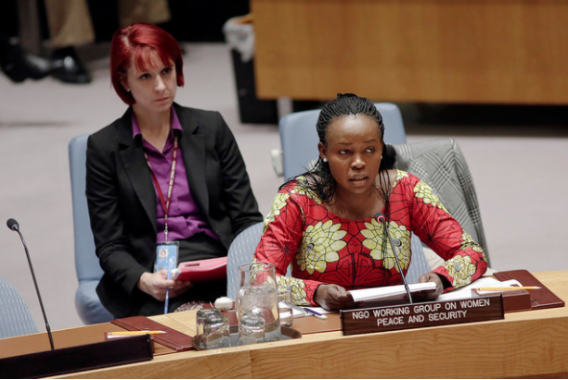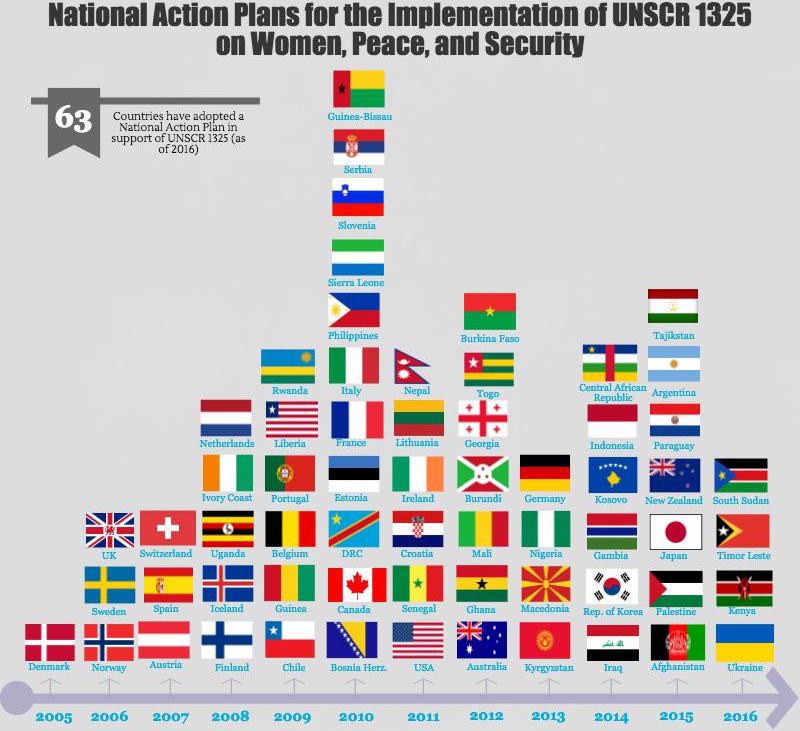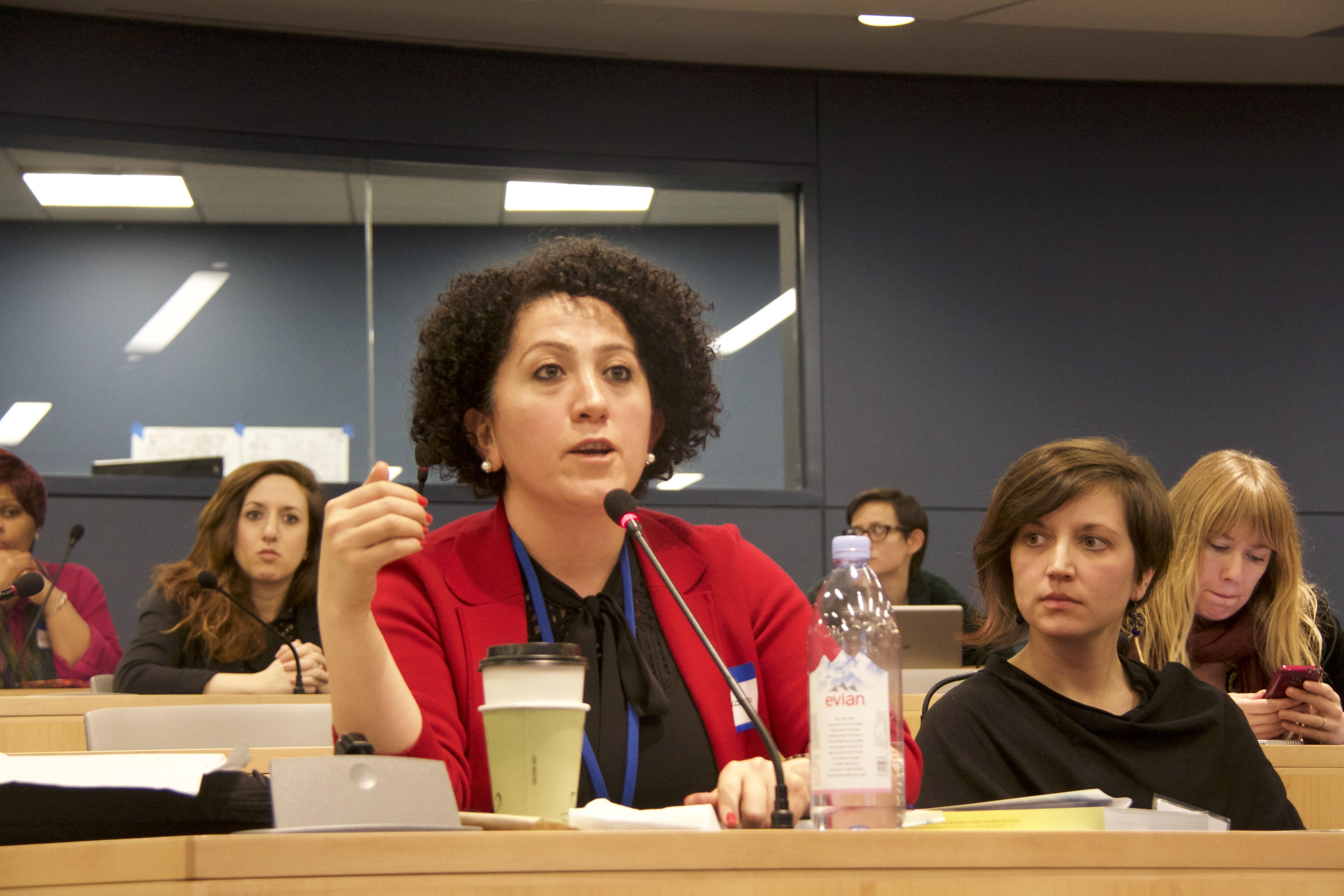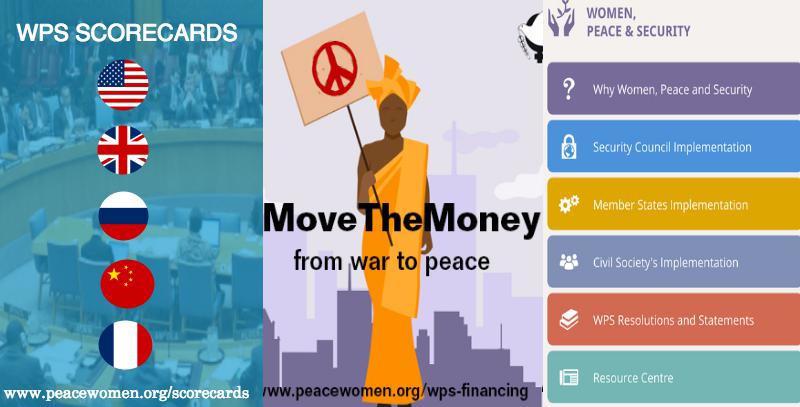Women Peace and Security E-News December 2016
2016 In Review: Be Brave
By WILPF PeaceWomen Programme Director Abigail Ruane
WILPF PeaceWomen Programme Director Abigail Ruane by the Freedom Bridge with memorial ribbons in South Korea, Demilitarised Zone. (Photo: WILPF)
With the horror of Aleppo this week, 2016 is reeling into a heartrending and anguished close. It has been a year of shocks -- Brexit, Colombia, US, Syria. Echoes of "never again" ring increasingly emptily, as we must now recognise how we are all complicit in the slaughter in Aleppo -- just as with Rwanda, Sarajevo, Srebrenica, and Darfur before. Any light that has come not from institutions (which have repeatedly failed) but from the bravery and kindness of individuals and local communities.
Why is it so difficult to put humanity first? We cannot continue being trapped into increasing escalation of violence. As WILPF Secretary-General Madeleine Rees and others have affirmed repeatedly: “Armed conflict is avoidable. We can make a choice.”
Putting humanity first requires asking questions about what we mean by "security" and "peace", rejecting the normalisation of all forms of violence, and cultivating and investing in the livelihoods of women and marginalised communities, whether in Syria or Sudan, Ukraine or Yemen. It requires creating a world of economic, social, and political justice that addresses past injustice and prevents further reoccurrence. As a student I met last week, who was conducting his military service in the Republic of Korea, commented: “We need another way.”
Last week I participated in a conference on UNSCR1325 and sexual violence in Seoul, Republic of Korea, held by the Korean Women’s Development Institute (KWDI) and the Korean government’s Ministry of Gender Equality and Family. I visited the Demilitarised Zone, which women crosseddemanding peace last year. Afterward, conference participants explored together how to rectify coercive systems to ensure access to justice for survivors of sexual, gender-based, and other forms of violence, and promote long-term peace.
One of the participants shared the story of Park Sook-yi, one of approximately 200,000 women who were coerced into being part of the rape centres known as “comfort stations” for the Japanese military during World War II. Despite a token contribution last year by the Japanese government, on 6th December 2016, this longstanding “Wednesday demonstration” activist died without access to justice – no reparations, and no perpetrators punished. Today, sexual violence around military bases such as in Djibouti continues to provide ongoing violations of women’s security and rights.
Creating change may seem huge and sometimes impossible. But as presenters at the conference last week noted, a lot of what we do requires just a bit of bravery. Ask yourself: “where are the women? Can I join? If none are at the table, suggest one to attend! If someone has not taken action, ask: can we?”
Being willing to question militarism and demand feminist peaceis of pressing importance in the Koreas, in Syria, and around the world. Whether it is at the Security Council or Human Rights Council, in Colombia or the UK, in homes or communities -- we all must be willing to demand action for peace, demilitarisation and gender justice.
At the end of 2016, there is much darkness in the world. Action is critical now.
We invite you to join us in promoting positive impact and light through a contribution to WILPF, giving the gift of WILPF membership, and becoming part of a global sisterhood and network for feminist peace.
Have a brave, just, and kind new year.
Monitoring the United Nations Security Council: Year in Review
By Sarah Tunnell
Rita Lopidia, Executive Director and Co-founder of EVE Organisation for Women Development, South Sudan delivers remarks at the UN Security Council WPS Open Debate (UN Women/Ryan Brown)
This year was a mixed year for the Women, Peace and Security (WPS) Agenda.
On one hand, 2016 was a year of firsts. It marked the first term of the Informal Expert Group (IEG 2242) established by UNSC Resolution 2242, which provides a key platform for the UNSC to integrate the WPS Agenda into country-specific action. 2016 also introduced a number of new initiatives to fund and support the Agenda, including the a pilot year for the Global Acceleration Instrument (GAI) and launch of the National Focal Point Network.
On the other hand, despite strong commitments in 2015, continued gaps on institutions and financing as well as increasing militarisation mean the Agenda has not yet been realised at the implementation level. In 2016, 53 percent of the states that made commitments to the WPS Agenda in 2015 failed to act on their promises. Furthermore, the percentage of the WPS-sensitive language in UNSC resolutions decreased by 28 percent from 2015.
2016 was also marked by endorsements of militarised counter-terrorism, women’s participation in peacekeeping and security forces, and chronically lacking disarmament language. This is a narrowing and militarisation of the agenda and poses substantial challenges for effective conflict prevention.
To unpack and challenge these developments, in 2016 WILPF/PeaceWomen monitored and analysed 23 open debates, more than 60 resolutions, and over 50 reportssubmitted by the UN Secretary-General to the Council. In October, we also launched the WPS Security Council Scorecard project to highlight discrepancies between the verbal commitments and implementation efforts of the permanent Security Council members.
There is still much work to be done! Join PeaceWomen in 2017 to continue to strive for a feminist Security Council.
Find the Analysis of the WPS Commitments made at the 2016 Open Debate on Women, Peace and Security here.
Find the Overview of the 2016 Secretary-General Report on Women, Peace and Security here.
Find the Summary of the Arria Formula Meeting on the Synergies between WPS Resolutions and the CEDAW Convention here.
National Action Plans Monitoring: Year in Review
By Anna Warrington
The number of National Action Plans developed and launched by UN Member States for the implementation of UNSCR 1325 as of December 2016. (Photo: WILPF/PeaceWomen)
Are National Action Plans (NAPs) an effective tool for implementing the Women, Peace and Security (WPS) Agenda? In 2016, we see unfortunately that despite the potential of NAPs, they too often remain check-the-box exercises without meaningful impact.
At the end of 2016, 63 UN member states (33%) had National Action Plans. Four new NAPs were launched, including plans by Kenya and Ukraine and announcement for plans by South Sudan and Timor Leste. In addition, the United States of America launched their second NAP, and the Netherlandsreleased a third NAP. Notably, neither of these all NAPs include specifically-allocated budgets, disarmament remains limited, and implementation mechanisms continue to be lacking.
Of the 63 NAPs adopted to date, only 12 include some allocated budget for implementation. Furthermore, less than half of the NAPs (40%) include references to disarmament. Strengthening conflict prevention commitments line with the Global Study on UNSCR 1325 and reviews on peacebuildingand peace operations is essential for a holistic approach that addresses root causes of conflict and violence. Substantially stepping up dedicated funding is critical for moving from words to action.
Some progress has been made with more Member Statesdeveloping NAPs. However, WILPF’s NAP monitoring shows that 38% (24 countries) of existing NAPs will expire by the end of 2016 with almost no commitments made to develop new or update existing plans. So far, only Canada, Spain, and Switzerland have committed to renewing their NAP, Angola, Brazil, Czech Republic, Croatia, and Kazakhstan, have also committed to launching NAPs in 2017. Bangladesh, Jordan, and Turkey have also expressed interest in drafting NAPs. Other states refrain from making concrete commitments for particular WPS-sensitive policies. In 2017, building on lessons learned for localising UNSCR 1325 to address key gap areas is critical for enhancing concrete action for local impact.
Find the most recent list of UNSCR1325 National and Regional Action Plans here.
Monitoring the United Nations: Year in Review
By Farida Ismail
Panelists and event organisers at the WILPF-supported event hosted by the Permanent Mission of Canada to the United Nations (Photo: Sarah Tunnell/WILPF/PeaceWomen)
In 2016 the work of the United Nations (UN) has been focused on the needs of the marginalised communities, including indigenous populations and refugees, as well as on the implementation of the Sustainable Development Goals (SDGs). As part of our work to strengthen conflict prevention efforts through disarmament and investing in gender equality, WILPF/PeaceWomen has monitored and analysed the political discussions around the major forums organised by the United Nations.
In July, WILPF/PeaceWomen has attended the very first session of the High Level Political Forum (HLPF), the annual accountability mechanism for the SSDGs, and monitored the Forum for gender and conflict issues, focusing specifically on SDG 5 (empowering women and girls) and SDG 16 (stable and peaceful societies). We also leveraged this space to build momentum on strengthening accountability and financing of gender equality and peace through a two-day workshop and follow-up side side event on Women, Peace and Security (WPS) Financing.
During the 2016 High-Level Summit for Refugees and Migrants, Member States adopted the New York Declaration on Refugees and Migrants acknowledging a shared responsibility to address the needs of refugees and migrants in a humane and people-centred manner. Later this month, the 71st Annual United Nations General Assembly (UNGA)General Debate took place. WILPF/PeaceWomen's analysis of the statements at the general debate reveals that there is much more work to be done to build adequate political will and commitment to gender equality and holistic understanding and implementation of the WPS Agenda.
We hope to see an increased effort by the new UN Secretary-General, Antonio Guterres, in his coming years to advance the WPS Agenda!
Find the Analysis of the 60th Session of the Commission on the Status of Women here.
Find the Analysis of the High-Level Thematic Debate on Human Rights here.
Find the Analysis of the High-Level Thematic Debate on Peace and Security here.
Find the Report on the High-Level Political Forum (HPF) here.
Find the Analysis of the High-Level Summit on Refugees and Migrants here.
FInd the Gender Index of Statements made at UNGA71 here.
Amplifying Voices of Women Peace Leaders: Year in Review
By Naimah Hakim
Hivin Kako, Executive Director of the Bihar Relief Organisation, speaks at WILPF and MADRE’s symposium during CSW 60 on March 15th. (Photo: WILPF / Marta Bautista)
In 2016 WILPF/PeaceWomen continued to amplify the voices of grassroots women peace activists from the local to the global level and call for concrete action, especially in key gap areas of conflict prevention, disarmament, and financing. We have organised and co-hosted a variety of initiatives focused on feminist mobilising at the local level throughout the year.
In March, 40 WILPF activists from around the globe have joined our partners and other members of the feminist movement at the 60th Commission on the Status of Women (CSW) to advocate for transformational change that moves from a political economy of war to a political economy of gender justice, demilitarisation, and peace. In this vein, we co-launched a symposium that created space for civil society organisations to mobilise around recommendations from the Global Study and identify next steps for effective implementation of the Women, Peace and Security (WPS) Agenda.
In September 2016, WILPF delegation of 19 activists attended the 2016 AWID Forum in Brazil to build a common ground for a nonviolent world for all and share our messages about the importance of disarmament and peace for feminist futures. We contributed to six events including a Feminist Playbook for Peace and launched our #MoveTheMoney Toolkit during the forum. This toolkit includes a range of materials - including a motion graphics explainer video available in five languages - intended to boost action on Women, Peace and Security Financing.
At the 16th anniversary of UNSCR 1325, WILPF worked with grassroots partners and international policymakers to call for concrete action, especially on key gap areas of conflict prevention, disarmament, and financing. WILPF hosted and contributed to multiple initiatives and events along with our partners from the Middle East North Africa (MENA) region who highlighted regional patterns in how gender blind institutions with militarised responses result in ongoing challenges to women’s rights and their meaningful participation in peace efforts and provided strong recommendations for strengthening the implementation of UNSCR1325 in the region.
We are looking forward to 2017 and upcoming opportunities to support grassroots feminist action. Join us!
Find the Analysis of the 60th Session of the Commission on the Status of Women here.
Find the #MoveTheMoney toolkit here.
Find the Policy Recommendations on the the Implementation of UNSCR1325 in the MENA Region here.
How to Move the WPS Agenda Forward: Useful Tools in 2017
By Nela Abey
(Visual: WILPF/PeaceWomen)
In 2016, WILPF/PeaceWomen’s focus on conflict prevention as a key gap area was the impetus for launching several new advocacy tools that can be used by civil society activists, scholars, and Member States to address existing gaps in a holistic implementation of the Women, Peace and Security (WPS) Agenda.
In September, we launched our Women, Peace and SecurityFinancing Toolkit, an advocacy tool that strengthens advocacy efforts to #MoveTheMoney from war and conflict to peace and gender justice.
October marked the launch of the expanded WPS Security Council Scorecard that can be used to as an advocacy tool to address ongoing gaps between commitments and accomplishments, especially around conflict prevention and disarmament.
Finally, in December 2016 we undertook technical updates of our WPS Mobile App allow for an easy monitoring of the international community's progress in integrating gender into its policies. The App will be available for a download and/or update by the end of 2016!
These initiatives are powerful resources aimed to enable WPS activists not only to hold relevant actors accountable but also to strengthen the WPS Agenda at all levels!





WILPF Initiatives
Monthly Action Points: December 2016
Good Practice Case Study: Engaging The Media On The Women, Peace And Security Agenda In Cameroon
Good Practice Case Study: Demilitarisation For Gender Equality And Peace In Colombia
Indigenous Women's Struggles Against Corporate Abuse In Guatemala
Aleppo Is Bidding Humanity Goodbye
Reports, Resources & Policy Briefs
How Can Gender Perspectives Be Introduced Into A World Of Male Researchers?
Donors Thinking Big: Beyond Gender Equality Funds
A Battle Not Yet Over: Displacement And Women's Needs In Post-Peace Agreement Colombia
One Year Later: Women Peace And Security - A Reflection
Protecting Mali’s Peace: The Role Of Civil Society
External Initiatives
Malawian Women Gather For Peace Building Conference
The People’s Tribunal On The Iraq War
The Women Scholarship For Peace
Grantmaking: Global Fund For Women
Women Wage Peace: Goals, Strategies, Action Plan For 2017
Engaging Men And Boys To End Gender-Based Violence: Online Discussion
Programme For Sweden’s Membership To The UN Security Council 2017-2018